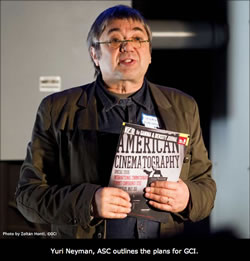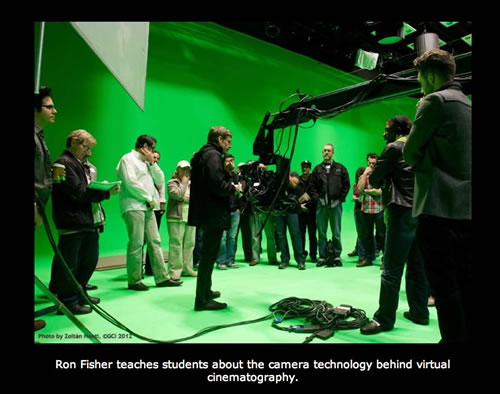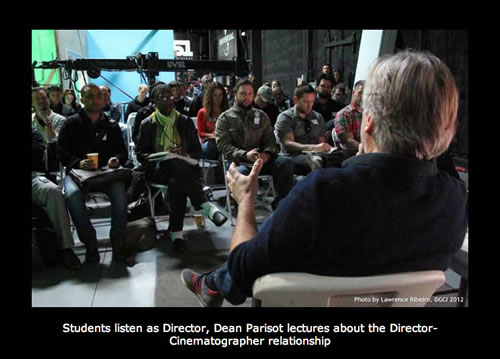On Campus News
| Global Cinematography Institute: Yuri Neyman, ASC Talks GCI, New Courses, and Lighting By StudentFilmmakers.com posted Oct 2, 2012, 11:45 |
 Global Cinematography Institute (GCI)
Global Cinematography Institute (GCI)
Yuri Neyman, ASC Talks GCI, New Courses, and Lighting
Experienced cinematographers and directors are coming to the Global Cinematography Institute (GCI) to upgrade their artistic and technological potential, to learn about new cinematographer's technologies and to be more competitive on the worldwide cinematographers market. Yuri Neyman, ASC talks with StudentFilmmakers.com and StudentFilmmakers Magazine about what's new at Global Cinematography Institute, new courses, and shares a few lighting tips.
What's new at the Global Cinematography Institute?
Yuri Neyman, ASC: Our Institute was founded only recently by me and Vilmos Zsigmond, ASC, and by the group of dedicated teachers, (www.globalcinematography.com/teachers.html). We finished the Second Course of our "Expanded Cinematography" classes and last week we started a new First Course, and another First Course will start on November 17th, 2012. All our students have to take the First Course where they study eight introduction classes (www.globalcinematography.com). And then graduates of two first courses form the Second Course where students study selected disciplines much deeper, and become ready for the very intense Third Course. Graduates of the Third Course will be able to "compete" on a very high professional level.
Based on our experience and feedback from students and teachers, new courses were added to the "Expanded Cinematography" curriculum. Also we increased screening programs and we watch now more films for such classes as "Advanced Cinematography for Feature Films," "History of Cinematography," and "Foundation of Lighting and Composition."
GCI's launching three new courses - "Cinematography in Video Games: Virtual Lighting and Previsualization," "Cinematography for Small Budget/Indie Films," and "Moderate and Micro Budget Production Hollywood-Style." What prompted the development and launch of the new courses and curriculum?
Yuri Neyman, ASC: More and more people – former and current film schools students and the Industry workers such as cinematographers, DIT's, AC's and loaders began to realize that "traditional cinematography" changed irreversibly. Not only technically but also aesthetically. We are the first cinematography school in the world who created the "Expanded Cinematography" curriculum which combines such disciplines as Advanced Lighting for Feature Films, Foundation of Lighting and Composition, Cinematography for Music Videos, Digital Cinematography and 3D Cinematography, Virtual Cinematography, On-Set Image Management and more. And it is just natural for Global Cinematography Institute to analyze constantly the situation and trends with the cinematography worldwide and to adjust to it, and then to continue to develop new disciplines for students and to perfect methods of education.
We were happy to receive recently the note from a future student saying, "From my review of cinematography programs it is very evident that your offer is the best (program) in quality." Probably we are doing something right.
What are some of the key learning goals and objectives for the new courses?
Yuri Neyman, ASC: We are devoted to preparing filmmakers to take advantage of on-going advances in digital and virtual cinematography technologies. Cinematography is a global language, which uses light and darkness, composition, camera movement, colors, focus, contrast and other elements of visual grammar to bring stories to life. The Institute will provide a forum where new and experienced filmmakers from all sectors of the industry can learn about the past, present and future of the art and craft of cinematography, including digital and virtual cameras and lighting.
Could you describe your teaching style? What's your philosophy? What is important?
Yuri Neyman, ASC: Our main educational principle is expressed very eloquently by Oscar Wilde: "Be yourself, everyone else is already taken." And what is the most important for us is the student individual development. We formulated our teaching style as a concept of attention of all teachers to TAISA™ principles developed by GCI.
T - Talent, its recognition and nurturing.
A - Ambitions development - reasonability and practicality of ambitions in movie world.
I - Imagination and its development and application to practical needs.
S - Skill.
A- Attitude - psychological preparations to deal with so many "different" people and how to not let them destroy you.
Does your school offer career assistance or job assistance?
Yuri Neyman, ASC: We plan to conduct seminars with leading cinematography agents. They will consult students about how to prepare the reel, how to represent themselves in the interview with director and producer, and how to be "the team player".
By the way, what kinds of cameras and camera systems do the students use?
Yuri Neyman, ASC: For classes of "Image Management," "Advanced Cinematography for Feature Films," "Digital Cinematography," and "Virtual Cinematography," we use a variety of cameras – Sony, Panasonic and Red.
Could you share with us three lighting tips as it relates to visual storytelling and story?
Yuri Neyman, ASC: Number One – Light must be visible. The light is the main tool of the cinematographer and if lighting is "invisible," flat and non-expressive – then the cinematographer most likely is showing to us an "unfinished" job.
Number Two – Light must be thoughtful. Audience must "understand" and accept consciously or subliminally that chosen by cinematographer lighting style helps the story and is right for the story.
Number Three – Light must "fit" the media. Not all lighting techniques developed for film production suit digital production, and some lighting technologies which are "natural" for digital cinematography, often impossible to mimic in film.
(Interview by StudentFilmmakers.com and StudentFilmmakers Magazine; published in Volume 7, No. 5, 2012, Print and Digital Edition.)
Resources:
http://www.globalcinematography.com/
https://www.studentfilmmakers.com/store/product.php?productid=17601

